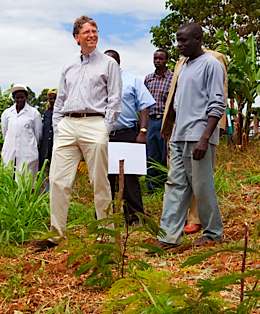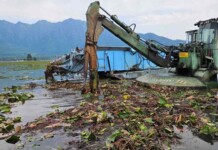 President Obama issued a directive for U.S. development policy in 2010 that called for social and political reforms as a prerequisite for foreign assistance, along with more investment from the private sector. Just one year into the project, U.S. government executives at a Washington conference Jully 12 reported on genuine progress.
President Obama issued a directive for U.S. development policy in 2010 that called for social and political reforms as a prerequisite for foreign assistance, along with more investment from the private sector. Just one year into the project, U.S. government executives at a Washington conference Jully 12 reported on genuine progress.
A few decades ago, U.S. government assistance made up 70 percent of the funds going from this country overseas, Littlefield said.
“And now today, it’s completely reversed. Eighty percent of the money flowing from the [United States] to the developing world is private capital,” said the president of OPIC, a government agency providing loans and investment insurance to American businesses operating overseas.
The Millennium Challenge Corporation is another U.S. government agency playing a significant role in overseas development by nudging countries toward social and political reform, according to CEO Daniel W. Yohannes.
“What we do is really creating the conditions, the environments, for businesses to be very successful in those countries,” Yohannes said. “We are building the infrastructure; we’re also making significant changes in those countries with policy reforms, which create a tremendous environment for businesses to be successful.”
But the really meaningful aspect of that partnership, Shah said, is how families affected by the Wal-Mart investments have been lifted out of poverty.
“You see that when you visit communities and people say, ‘Two or three years ago we were earning a couple hundred dollars a year and we were struggling, our kids were working on the farm,’” Shah recalled from a visit to the region. “‘Today we’re earning over a thousand dollars a year, kids are going to school.’ … That’s ultimately the pathway out of poverty.”
One genuine strength of the development policy outlined by the Obama administration, OPIC’s Littlefield said, is focusing energies from multiple sectors on development needs.
One long-standing assumption about foreign aid that needs to be discarded, these panelists said, is that the beneficiaries are all in other countries. By helping to raise people overseas out of poverty and into the middle class, foreign aid and private investments overseas contribute to overall economic growth and create markets for U.S.-made products and jobs for the people who make them.
The U.S. government aid executives participated in this discussion at a conference held by the U.S. Global Leadership Coalition.
(Source USembassy.gov)



















